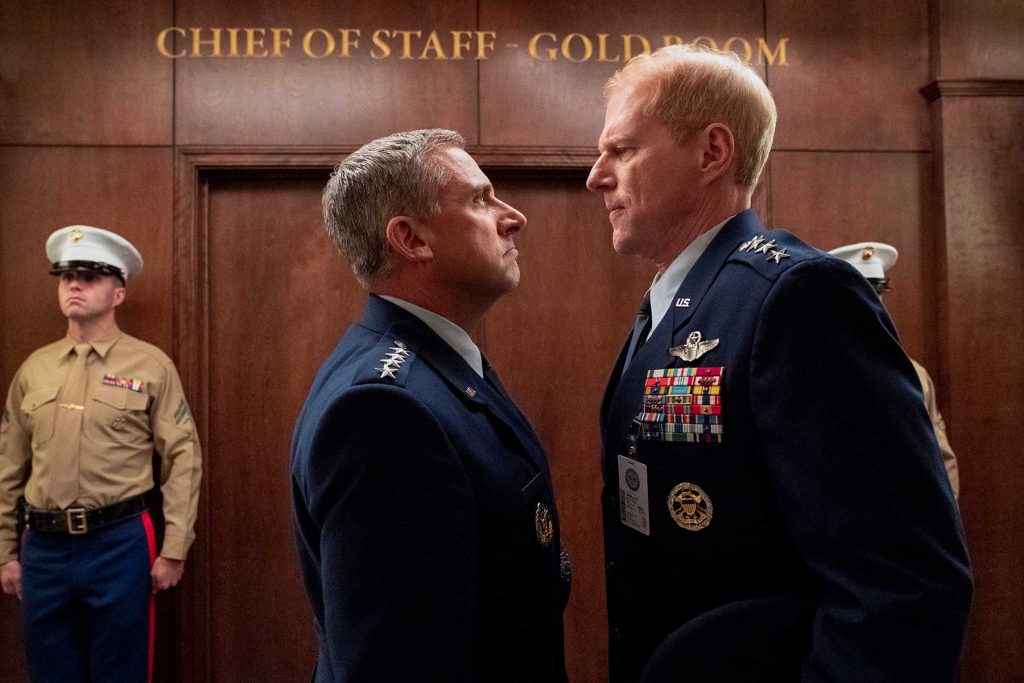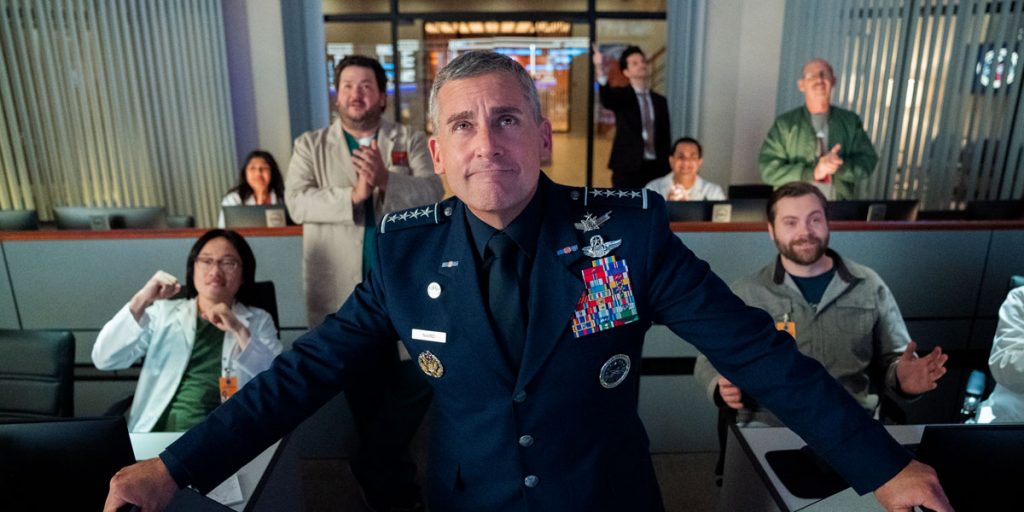Netflix’s Space Force starts from a good premise but ends up a satire of itself, proving that a good idea is not enough to make for an entertaining show.
A good idea is not always enough to keep a show running, and Netflix’s Space Force proves it with a 10-episode-long comedy series that doesn’t really know what it wants to be. Which is a shame, as the premise for co-creators Steve Carell (The Office) and Greg Daniels (The Office, Parks and Recreation)’s “new kind of work place comedy” was an excellent one indeed. As revealed by its self-explainatory title, the series is inspired by Donald Trump’s real-life “Space Force”, a military branch established by the U.S. President in December 2019, and tasked with the mission of engaging in space “warfare”.
As you can imagine, this sparked a great deal of controversy, which wasn’t helped by the fact that the Air Force’s new Department also comes with a logo that bears a striking resemblance to Star Trek’s insignia. When the actual, real-life story already belongs to the Theatre of the Absurd, one would imagine its fictional adaptation to be as darkly comical as what inspired it in the first place. However, there’s a thin line between the irreverent and the ridicule – a line that Space Force fails to recognise way too many times.
Space Force revolves around the multi-decorated, four-star general/pilot Mark R. Naird (Steve Carell), who is suddenly appointed as the leader of a newly formed branch of the US Armed Forces, whose main assignment consists of “getting American boots on the Moon” and “achieving space dominance”. As he moves to Colorado with his Phoebe Buffay-like wife (Lisa Kudrow) and twenty-something daughter (Diana Silvers), he embarks on a new adventure with a team of very diverse scientists, whose plans won’t always turn out the way they’d hoped. Which is exactly the point in which Space Force‘s flaws begin to show.
Space Force is not all bad. Episode 1 features an all-star cast, including the only somewhat lenghty appearance of a wonderfully sarcastic Jane Lynch (Glee) and one of John Malkovich (Dangerous Liaisons, The New Pope)’s many attempts to elevate the show’s bland writing with the high level of acting he’s gotten us used to. In fact, the aptly named first episode (“The Launch”) sets us off for a good start: not only does it give us a good premise for a series of space (mis)adventures, but it introduces a team whose heroes consist of recognisable faces from our favourite comedy shows. Not only that, but the quality of its editing (Miracle Workers‘ Rob Burnett), art (Ad Astra‘s Gary Warshaw) and sound design (among others, The Office‘s Benjamin Patrick and The X Files‘s Sean Garnhart, both Emmy Award winners) is remarkable, and calls for aesthetically pleasing sequences, with a score made of incredibly catchy tunes and well-placed sound that gives more depth and credibility to the action.

Only, there is very little action in Space Force. In a show that consistently lacks rhythm, what we get is an odd blend of Super Mario-like space combat, office banter, distasteful animal sequences, less than credible Chinese and Indian attacks, way too much dancing and singing, under-developed father/daughter bonding moments, ineffective social commentary, obvious discussions about racist stereotypes and the odd serious moment of self-reflection – which, needless to say, doesn’t work. Because Space Force seems to be so concerned with trying to be both a light comedy and a serious drama about real political issues that it ends up forgetting about the most basic things. Not only is most of the action not really set in space, as the title would suggest, but we are never given a reason to like any of the characters: the lack of backstory to explain their motives, combined with a lead whose most memorable feature is a very annoying, fake-sounding voice, makes for a show in which each of the ten thirthy-minute long episodes is perceived like a very long Terrence Malick film in itself.
Despite its remarkable technical features, Space Force suffers from a screenplay that gets us used to jokes that never land and exciting things that never happen, as well as cringe-worthy lines such as “my fuel makes your rocket burn” and “have you addressed the possible hazard of werewolves on the moon?”. One episode after the other (that is, if you get past Episode 2’s animal weirdness), you get used to the lenghty conversations and cheap jokes. So much so that, by the time you reach Episode 6, even a slightly more sophisticated, not entirely entertaining scene involving John Malkovich bursting into song seems to be the funniest scene you’ve seen in years, and that is a shame.
I really wanted to like Space Force. Our current political climate and our longtime fascination with space called for what could have been exactly what we needed to keep us entertained in these challenging times. However, what originated as a much-needed dark comedy with an excellent premise inspired from real-life events turned out to be a satire of itself. The good news is that Space Force‘s ending leaves room for a second season: one can only hope that it features a better screenplay than the first.

